 The European Commission announced yesterday that it wants to give a boot up the backside of the European market for online music services by making it easier for new providers to get licences to flog songs over the Internet.
The European Commission announced yesterday that it wants to give a boot up the backside of the European market for online music services by making it easier for new providers to get licences to flog songs over the Internet.
If all goes to plan, it will get rid of pesky restrictions which prevent bargain-hunting Belgium’s and hussling Hungarians from buying cheapo downloads elsewhere due to current laws stopping companies offering EU-wide services.
Clipboard-toting investigators from the EC identified the hassle that companies face in getting licences to offer music across the whole of Europe, as the main obstacle to the growth of legal online music services.
Presently, online music providers have to laboriously apply for licences in each and every one of the 25 member EU states, and then deal individually with collecting societies charged with securing royalties for artists and music firms.
We’ve covered this before back in May and November last year, originally when the EU challenge EU-wide music royalty structure and latterly when the European Music Rights hearings were on.
Internal market commissioner Charlie MacCreevy said: “The absence of pan-European copyright licences made it difficult for the new European-based services to take off. This is why we are proposing the creation of Europe-wide copyright clearance.”
The European Commission’s study argues that entirely new structures for cross-border management of copyrights were needed, concluding that this could be best achieved by letting artists and content providers to choose a collecting society to manage their copyrighted work across the whole of the EU.
With the Commission cheesed off with collecting societies basking in actual or effective monopolies in many EU member states, the new measures would increase earnings for copyright holders by lowering administrative costs and allowing the most efficient societies to compete for artists.
A proposal from the Commission aimed at abolishing the current situation where copyright holders are compelled to register with their national collecting society is expected in the third quarter.
Lucy Cronin, executive director of the European Digital Media Association (EDIMA) was as pleased as Punch with the initiative: “After years of toil, we’re pleased that the Commission has recognised the problem in the online music licensing regime.”
“The current system, based on national licensing and collecting societies, is no longer appropriate for digital services” she added.
Cronin felt that this new legislation could also benefit consumers, with an increase in pan-European licences increasing the amount of downloadable music available, as copyright holders look to exploit larger markets.
With the IT industry arguing that sales have been held back by the lack of a simple, one-stop online licensing system, online music sales in Europe remain miserably small compared to our American cousins – €28m (~£19,1m, $33.3m compared to the whopping great €207m (~£142m, ~$246m) US trade.
European Union
 PodGear PockParty
PodGear PockParty Is this something to buy? It’s VERY convenient as it’s so small and does easily fit in your pocket (as the name suggests) and it can be heard by a a group of people in the right surroundings.
Is this something to buy? It’s VERY convenient as it’s so small and does easily fit in your pocket (as the name suggests) and it can be heard by a a group of people in the right surroundings.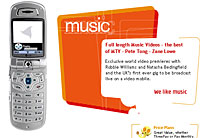 Consumer demand for mobile downloads is going bonkers, according to research by LogicaCMG.
Consumer demand for mobile downloads is going bonkers, according to research by LogicaCMG. Globally, subscribers just lurve downloading ring tones, games and music, with news and sports also gaining a growing audience in Europe.
Globally, subscribers just lurve downloading ring tones, games and music, with news and sports also gaining a growing audience in Europe.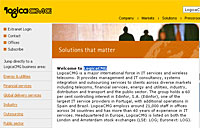 Mobile phone users are starting to experiment with their phones’ capabilities but, drawing a parallel with the popular SMS experience, it is clear that the service needs to be simple, safe and intuitive from initial browsing through to payment and download.
Mobile phone users are starting to experiment with their phones’ capabilities but, drawing a parallel with the popular SMS experience, it is clear that the service needs to be simple, safe and intuitive from initial browsing through to payment and download.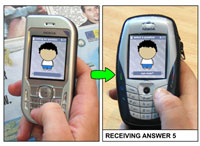 Dysfunctional drunks, lurking loners and nervous nerds need no longer feel alone thanks to a new mobile phone guessing game called YOU-WHO.
Dysfunctional drunks, lurking loners and nervous nerds need no longer feel alone thanks to a new mobile phone guessing game called YOU-WHO.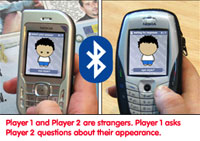 Once a set number of clues have been given, the players’ phones ‘call’ to each other with a distinctive sound, thus revealing both players’ locations and identities, quickly followed by screams of “Aaaargh!” Get away from me you weird freakshow nerd!”
Once a set number of clues have been given, the players’ phones ‘call’ to each other with a distinctive sound, thus revealing both players’ locations and identities, quickly followed by screams of “Aaaargh!” Get away from me you weird freakshow nerd!”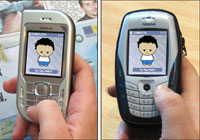 You-WHO is offered as a free 28 day time-limited demo. The cheery young developers at AgeO+ hope to have a full commercial release soon.
You-WHO is offered as a free 28 day time-limited demo. The cheery young developers at AgeO+ hope to have a full commercial release soon.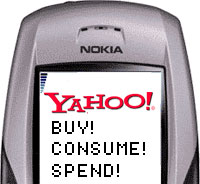 Buying goods with your PC may soon be as hip as dancing to a Chris De Burgh remix if the latest innovation from Yahoo Japan takes off.
Buying goods with your PC may soon be as hip as dancing to a Chris De Burgh remix if the latest innovation from Yahoo Japan takes off. It can be a confusing life for protesters keen to voice their opinions at the G8 meeting in Gleneagles.
It can be a confusing life for protesters keen to voice their opinions at the G8 meeting in Gleneagles.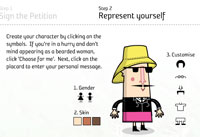
 All those signing up will have their names added to the online petition, the Live 8 list, which is being sent directly to the G8 leaders.
All those signing up will have their names added to the online petition, the Live 8 list, which is being sent directly to the G8 leaders.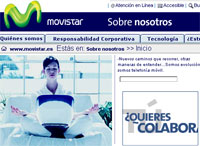 Abertis Telecom, Nokia and Telefonica Moviles Espana have emerged smiling from a big converging huddle with news of a mobile TV pilot using Digital Video Broadcasting-Handheld (DVB-H) technology.
Abertis Telecom, Nokia and Telefonica Moviles Espana have emerged smiling from a big converging huddle with news of a mobile TV pilot using Digital Video Broadcasting-Handheld (DVB-H) technology. These will be equipped with a “special accessory” to receive the mobile TV broadcasts.
These will be equipped with a “special accessory” to receive the mobile TV broadcasts. Outdoor and indoor signal and broadcast quality will also be tested to help fine tune the best technical parameters for the viability of DVB-H based services.
Outdoor and indoor signal and broadcast quality will also be tested to help fine tune the best technical parameters for the viability of DVB-H based services. It used to be that attending a festival was more akin to a long trek in a distant country, with festival-goers vanishing for days on end, uncontactable by the outside world.
It used to be that attending a festival was more akin to a long trek in a distant country, with festival-goers vanishing for days on end, uncontactable by the outside world.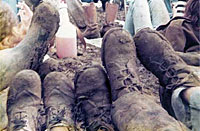 Like Glastonbury, Live 8 and several other big music festivals, band’s performances at the Reading Festival will be available to view over the Web via a streaming Webcast, with official sponsors Tiscali providing the coverage.
Like Glastonbury, Live 8 and several other big music festivals, band’s performances at the Reading Festival will be available to view over the Web via a streaming Webcast, with official sponsors Tiscali providing the coverage.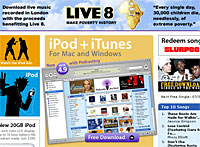 Hot on the heels of the hugely successful Live8 concert in London, Apple’s iTunes Music Store has made the opening performance of The Beatles’s “Sergeant Pepper” (sung by McCartney with U2) available for purchase through its store.
Hot on the heels of the hugely successful Live8 concert in London, Apple’s iTunes Music Store has made the opening performance of The Beatles’s “Sergeant Pepper” (sung by McCartney with U2) available for purchase through its store. Distribution is to be exclusively digital, so there will be no physical product. All profits are to be donated to Live 8, “and the fight for the future of Africa”, according to the iTunes Website.
Distribution is to be exclusively digital, so there will be no physical product. All profits are to be donated to Live 8, “and the fight for the future of Africa”, according to the iTunes Website. Sony’s PlayStation Portable is a media hub, but unfortunately, apart from games there isn’t really any content available for it (not forgetting unlucky UK citizens who can’t even officially buy one until September).
Sony’s PlayStation Portable is a media hub, but unfortunately, apart from games there isn’t really any content available for it (not forgetting unlucky UK citizens who can’t even officially buy one until September). Using an Apple Mac has many advantages and ripping DVDs is one of them. Look for an application MacTheRipper, it does exactly what is says on the tin, and takes the MPEG2 information from a DVD while removing region coding, macrovision and other DVD annoyances and stores the resulting files on the hard disk.
Using an Apple Mac has many advantages and ripping DVDs is one of them. Look for an application MacTheRipper, it does exactly what is says on the tin, and takes the MPEG2 information from a DVD while removing region coding, macrovision and other DVD annoyances and stores the resulting files on the hard disk. Windows users don’t despair
Windows users don’t despair